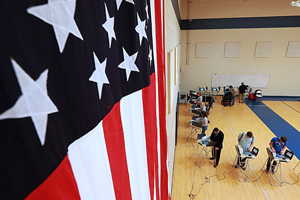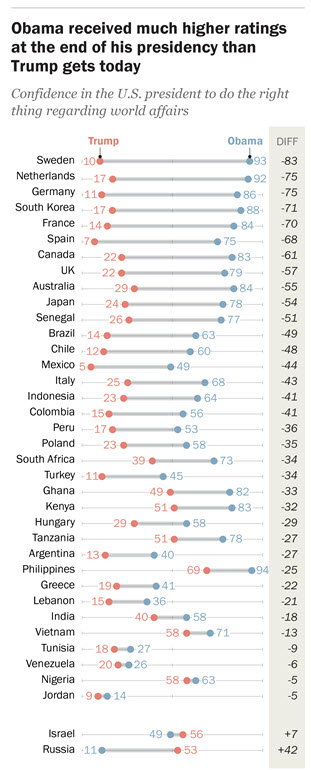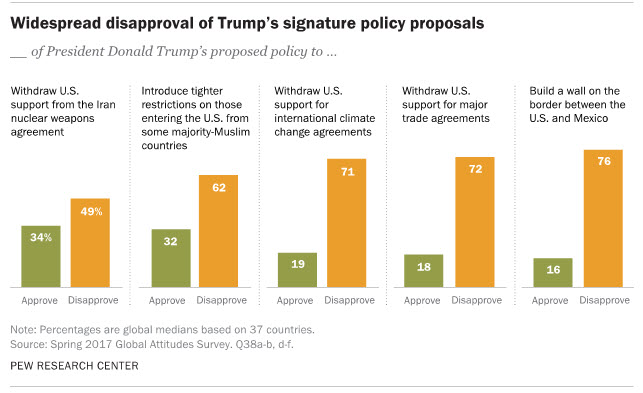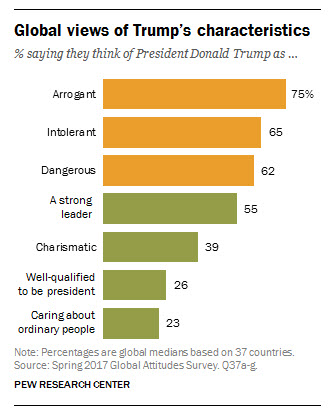The April 4th bombing of the rebel-held Syrian town of Khan Sheikhoun used a special, but conventional, weapon and not one armed with sarin gas, contrary to what President Trump and the media assumed. In an emotional response to images of dead children, Trump ignored contrary intelligence reports when he 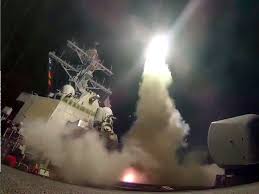
The force of departing missiles rocks destroyer U.S.S. Porter.
had the U.S. Navy unleash 59 Tomahawk cruise missiles at the air base from which the attack planes flew.
Those are some of the findings of veteran American investigative reporter Seymour Hersh, writing in the German publication Die Welt. He says that intelligence was already in hand that the Syrians were targeting a meeting of leaders of two jihadist groups in the town — one of them the al Qaeda offshoot, al-Nusra — for which the Russians had unusually provided a laser-guided bomb to the Syrians. In turn the Syrians had chosen its best pilot and wingman to deliver it, flying their Syrian SU-24 bomber. Some American military and intelligence officials were alarmed by the president ‘s determination to ignore the evidence, says Hersh. “None of this makes any sense”, he quotes one officer saying to colleagues when he heard the decision to bomb the Sheyrat airbase. “We KNOW that there was no chemical attack … the Russians are furious”.
The president called Syria’s attack “horrible, horrible”, a “terrible affront to humanity” and said that “When you kill innocent children, innocent babies — babies, little babies… that crosses many, many lines, beyond a red line”. He blamed Obama for his “weakness and irresolution” in failing to deal with Syrian President Bashar al-Assad’s previous chemical assaults on his people, evidently unaware that Obama had in 2013 agreed with Vladimir Putin for the Russians to oversee removal of all chemical weapons from Syria.
That it was a gas attack was unhesitatingly accepted by the media. Russia insisted there had been no chemical attack but The New York Times headline assured us, “White House Accuses Russia of Cover-Up in Syria Chemical Attack”. They were no exception.
Like Bush looking for reasons to attack Iraq immediately after 9/11, President Trump told his defense department to prepare retaliatory options with no consideration of what intel we might have. On April 6, two days after the attack, he met with his national security team at his Mar-a-Lago club not to decide whether something should be done, but to decide what to do in retaliation. Other than the videos of the dead and dying, their provenance uncertain only two days after the bombing, there was no intelligence proving that it had been a chemical bomb, and no interest in first probing for evidence. Over the previous 48 hours, Hersh reports, intense briefings and advice from his national security team could not sway the president to wait until more could be learned. Hersh had been given transcripts of real-time communications that followed the Syrian attack. He writes:
“I learned of the total disconnect between the president and many of his military advisers and intelligence officials, as well as officers on the ground in the region who had an entirely different understanding of the nature of Syria’s attack on Khan Sheikhoun”
But the president had made up his mind that it was a gas attack by the Assad military. “Everyone close to him knows his proclivity for acting precipitously when he does not know the facts,” a source said to Hersh. “He was told we did not have evidence of Syrian involvement and yet Trump says: ‘Do it'”.
Hersh describes the source for most of his report as “a senior adviser to the American intelligence community, who has served in senior positions in the Defense Department and Central Intelligence Agency”. It is Hersh’s talent to find people deep on the inside who will talk and Hersh quotes “the adviser” throughout his account. If his name is not familiar, it was Seymour Hersh who uncovered the My Lai massacre in the Vietnam War. It was Sy Hersh who, along with CBS’s “60 Minutes”, exposed the mistreatment and torture of prisoners at Abu Ghraib prison in Iraq. And it was Hersh who wrote four years after the takedown of Osama bin Laden that Pakistan had known of his whereabouts and of the SEAL raid in advance, but the U.S. government concocted an elaborate cover story with the Pakistanis to yield maximum political payoff for Barack Obama in the run-up to the 2012 election. That was a story that Americans didn’t want to hear. Much as American media evidently shunned this story — hence publication in Germany — his Obama exposé had to find ink in the U.K.
in theater
Qatar, a peninsula protruding into the Persian Gulf across from Iran, is host to the largest U.S. military base in the Middle East. The U.S. military’s 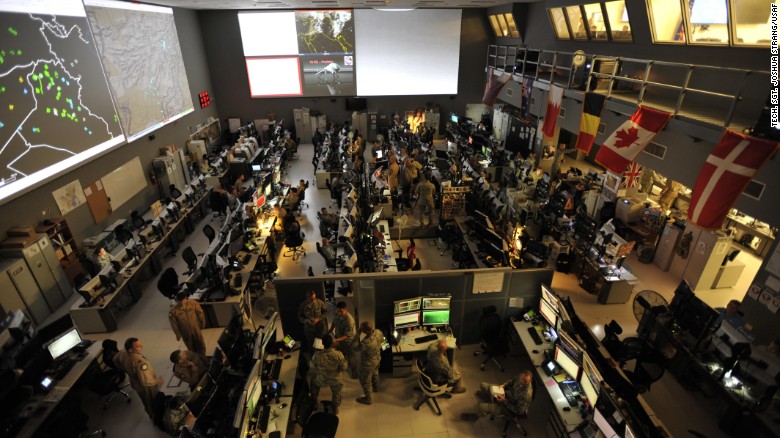
The U.S. command and control center near Doha, Qatar.
Central Command and some 11,000 American troops are stationed there, southwest of capital city Doha. Unaware of our significant presence in Qatar and taken in by Saudi Arabia during his recent visit there, Donald Trump caused a major rift by siding with four Middle East nations that have locked out Qatar — air traffic, travel, commerce — for its support of Islamist groups.
Out of the air operations center at Udeid Air Base fly our AWACs — Boeing aircraft stuffed with radar and electronic gear that provide command and control of air traffic throughout Iraq, Syria, Afghanistan, and 17 other nations. Americans and Russians, with Russians acting for Syria as well, routinely file flight and attack plans with the AWACs to prevent collisions and incidents, a practice known as “deconfliction” that so far has worked to perfection despite warplanes moving through the airspace at near or greater than supersonic speed.
Details of the Syrian flight-plan to and from Khan Sheikhoun had been logged by the Russians with the deconfliction crew aboard the AWACs directly, in English, days ahead. Hersh was told that the Russians even passed a warning directly to the CIA that if we had any infiltrated operatives in the area, they should leave or at least avoid the jihadist groups’ meeting.
The Russians had operated a drone above the site for days to mark the building’s comings and goings, said Hersh’s contact, who was able to give a detailed description of the target where the meeting was to be held, even to the extent of the shops on the ground floor of the two-story building. Because the rebel factions control the town of 48,000 by doling out essentials such as “food, water, cooking oil, propane gas”, Hersh’s adviser told him that these, as well as fertilizers and insecticides for growing crops in the farming region and “chlorine-based decontaminants for cleansing the bodies of the dead before burial”, were stored in the basement.
After the bombing, treating victims at their clinic 60 miles to the north, Médecins Sans Frontières (Doctors Without Borders) reported that “eight patients showed symptoms — including constricted pupils, muscle spasms and involuntary defecation — which are consistent with exposure to a neurotoxic agent such as sarin gas or similar compounds”. Hersh says “the organophosphates used in many fertilizers…can cause neurotoxic effects similar to those of sarin”. Other hospitals reported that patients “smelled of bleach, suggesting that they had been exposed to chlorine.”
A sarin bomb releases gas. It has no explosive power, which argues for normal munitions dispersing the fertilizer and chlorine. The American military produced what is called a Bomb Damage Assessment that dismissed any notion of a sarin attack by theorizing that the heat and explosive power of the 500-pound Russian bomb they knew about may have set off secondary explosions that released the fertilizer and the disinfectants to form a deadly cloud over the town.
Could the Russians have been duped by the Syrians fabricating the story about the meeting? Apart from what sense would it make for Assad to lie to his Russia patrons on whom he relies for winning his war, the Russians would have known of the loading of a sarin bomb. They fly out of Sheyrat as well. “Military grade sarin includes additives designed to increase toxicity and lethality”, says Hersh’s confidant, and the Russians would have seen everyone involved with the transport, loading and arming of a sarin bomb in conspicuous Hazmat clothing to protect against a leak.
For the media that said the Russians were in on the sarin attack and had fed us disinformation — a phony story about a jihadist meeting. That was effectively the U.S. position, immediately accusing Russia of a cover-up of the Syrian action. But none of the media knew of deconfliction reports about the mission that the Russians had supplied to U.S. Central Command, nor of the elaborate coordination that goes on in theater, far from Washington. And there is this photo, taken by the Syrian 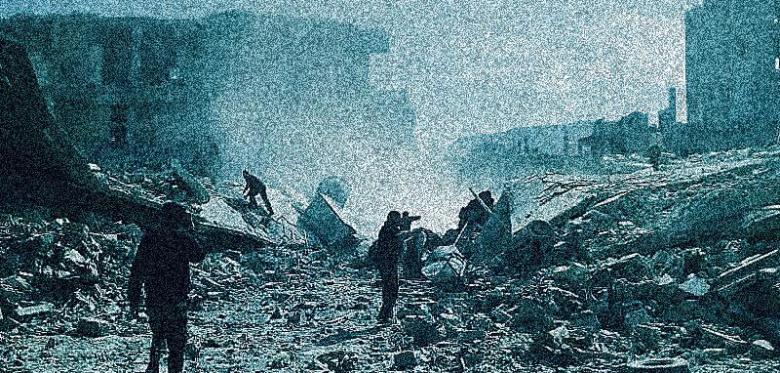
This photograph by the Syrian opposition (Edlib Media Center) shows the aftermath of a strike against the town of Khan Sheikhoun. A large building was hit, but it’s unclear were the strike took place exactly.
opposition says its caption, purportedly of the town of Khan Sheikhoun after the raid, showing damage that sarin bombs do not cause.
trying again?
On Monday, June 26th, Press Secretary Sean Spicer issued an unusual statement at night saying that the “United States has identified potential preparations for another chemical weapons attack by the Assad regime”, activity that resembled the preparations that preceded the April attack. The White House threatened that if “Mr. Assad conducts another mass murder attack using chemical weapons, he and his military will pay a heavy price.”
Just as preparation for sarin attacks resemble each other, it should be evident that so would preparations for conventional weapon attacks.
Hersh’s story had run on Sunday, the day before the White House communiqué. Just two days after the White House edict, Trump’s national security team announced that the warning to Assad had succeeded in stopping the chemical weapons attack. No mention was made of any signal coming from the Syrians or the Russians. Defense Secretary James Mattis simply said “They didn’t do it”, which he repeated three times. The media bought it. The story went away immediately. We were to accept that no raid in two days should be taken as certainty that Assad had obeyed the U.S.
Or should we think that the White House got wind of Hersh’s story of just days before, now realizing that they had been ignorant in their haste of the pre-announced mission of the April attack and unaware of its special nature using a Russian guided bomb. Mindful now that murmurings of new preparations might be another conventional weapons assault in the works, were they worried that there might have been no sarin bomb attack on April 4th? Best to go silent in a hurry and hope that a story in a German publication would escape notice.
One can argue, what’s the difference? Either way, horrible deaths by chemical substances were caused. What makes for difference is the impetuous decision making by this president, decisions which have no interest in first assessing what our intelligence assets work to gather around the world. He had earlier decided while eating dinner to give the go-ahead to the raid in Yemen that cost the death of one SEAL, the wounding of others, and the loss of an attack helicopter. Much more serious incidents surely lie ahead. Will this president continue to ignore the pleadings of his staff because he thinks his instincts are more reliable than facts? He has said so: “I’m a very instinctual person, but my instinct turns out to be right”.
Published just one day before the White House threat against Assad,
Hersh’s article ends with his adviser saying to him “The issue is, what if there’s another false flag sarin attack credited to hated Syria? Trump has upped the ante and painted himself into a corner with his decision to bomb. And do not think these guys are not planning the next faked attack. Trump will have no choice but to bomb again, and harder. He’s incapable of saying he made a mistake.”
Jul 8 2017 | Posted in
Defense |
Read More »

